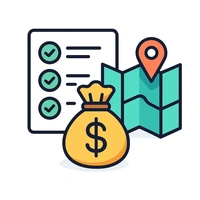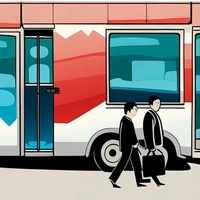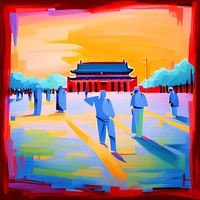
How to Plan a Budget Trip in Beijing, Beijing, China

1. Use Public Transportation
Public transportation in Beijing is affordable, efficient, and well-connected. The subway and buses can take you to most tourist spots and are much cheaper than taxis. Purchasing a transportation card will save you time and offer small discounts.
- Cost: Subway fares start low, and the bus is even cheaper.
- Convenience: The transportation system covers extensive areas of the city.
- Availability: Frequent services reduce waiting time.

2. Visit Free Attractions
Many landmarks in Beijing can be visited for free, like the 798 Art Zone. This district offers a unique take on the local art scene within charming, old industrial buildings. It's an excellent area to explore street art and contemporary galleries.
- Cost: No entry fee required.
- Cultural Exposure: Offers insights into Beijing's modern art culture.
- Location: Centrally located and accessible via public transport.

3. Eat Like a Local
Street food and markets provide an authentic taste of Beijing at a fraction of restaurant prices. Local cuisines such as Jianbing and Baozi offer delicious and cheap meal options. Night markets are particularly good for grabbing flavorsome snacks.
- Cost: Typically cheaper than dining in a restaurant.
- Flavor: Authentic local tastes that differ from tourist-oriented restaurants.
- Variety: A broad range of food types available.

4. Use Shared Bikes
Rent bicycles through Beijing’s bike-sharing programs to explore the city at your own pace. It's cost-effective and provides a great way to see Beijing’s hutongs and back alleys. Bike rental services are available at nearly every corner.
- Cost: Low rental fees as compared to other transportation options.
- Flexibility: Travel directly from point A to B without waiting.
- Exercise: Offers a healthy alternative to public transport.

5. Stay in Hostels or Guesthouses
Hostels or budget guesthouses are significantly cheaper than hotels and offer the chance to meet other travelers. They often have shared amenities, which further reduces costs. Some hostels offer free or discounted city tours.
- Cost: Generally lower nightly rates than hotels.
- Social Experience: Opportunities to connect with fellow travelers.
- Location: Often situated in the city center with easy access to public transport.

6. Explore Parks and Gardens
Beijing’s parks, like Jingshan Park, are budget-friendly spots for leisure and relaxation. Located opposite the Forbidden City, this park offers stunning views of the entire city. Parks also host free activities like tai chi or group dancing.
- Cost: Low entry fees.
- Relaxation: A peaceful escape from the city's hustle and bustle.
- Activities: Free local events and engaging activities.

7. Plan Trip in Off-Peak Season
Traveling during off-peak seasons can help you save considerably on accommodations and flights. Weather conditions are comfortable, and you avoid large crowds at major attractions. Consider traveling in late fall or early spring.
- Cost: Lower travel and accommodation rates.
- Availability: More options and fewer crowds at attractions.
- Weather: Cooler and comfortable climate.

8. Buy Attraction Combi-Tickets
Combo tickets for nearby attractions can cut down individual entry prices. Sites like the Summer Palace and its surrounding landmarks offer combined ticket packages. Ensure to purchase them at authorized counters or online platforms.
- Cost: Reduced prices compared to buying separate tickets.
- Convenience: Covers multiple sites in one go.
- Validity: Tickets are often valid for multiple days.

9. Use Free City Tours
Join free walking tours to learn about Beijing without spending a fortune. These tours run on tips, so you decide how much they are worth. Local guides provide insider knowledge about the city’s history and culture.
- Cost: Pay only what you think is appropriate.
- Information: Insightful explanations from knowledgeable guides.
- Flexibility: No commitment to pay upfront.

10. Avoid Overpriced Souvenirs
Steer clear of tourist-heavy shops and buy souvenirs at local markets instead. Markets like Panjiayuan offer similar items at better prices. Negotiating prices is both common and expected in these places.
- Cost: Generally cheaper than tourist shops.
- Authenticity: Unique and traditional items.
- Bargaining: Offers the opportunity to haggle for a better deal.

11. Download Offline Maps
Using offline maps helps in navigating the city without incurring roaming charges. Apps like Maps.me or Google Offline Maps save data and function without an internet connection. This is handy for locations where Wi-Fi isn’t available.
- Cost: Internet-free navigation removes data charges.
- Accessibility: Always available without needing signal or service.
- Usability: Helps in avoiding getting lost.

12. Get a City Pass
A city pass can save you money on public transportation and entrance fees. These passes sometimes include discounts at restaurants and shops as well. Plan the attractions in advance to maximize the use of the pass.
- Cost: Discounted travel and entry fees.
- Convenience: Often includes multiple benefits.
- Usability: Best suited for fast travel across multiple destinations.

13. Enjoy Tiananmen Square
Visiting Tiananmen Square, the world's largest city square, is free of charge. It's a great spot for photography, especially during sunrise or sunset. The square is rich in cultural and historical significance.
- Cost: Free access year-round.
- Cultural Insight: Offers historical context and significance.
- Photography: Ideal for panoramic photos.

14. Attend Local Festivals
Experience the local culture at various free events and festivals. Events like the Chinese New Year can include public performances, parades, and fireworks that you can enjoy without any cost. Check the city’s event calendar before you travel.
- Cost: Free spectator events.
- Cultural Exposure: Deep dive into local traditions.
- Timing: Ensure travel times coincide with major festivals.

15. Buy a Chinese SIM Card
Purchasing a local SIM card avoids international roaming charges. Most cards are affordable and come with data packages to stay connected. SIM cards can be bought at the airport or local shops with ease.
- Cost: Avoids expensive roaming charges.
- Connectivity: Keeps you online throughout your trip.
- Ease of Purchase: Readily available upon arrival.

16. Pack Snacks
Carrying snacks reduces reliance on expensive convenience stores or cafes. Foods like nuts or dried fruits are easy to pack and nutritious. This is particularly helpful during long days of sightseeing.
- Cost: Savings on expensive snack options.
- Convenience: Easily accessible during day trips.
- Nutrition: Healthy alternatives to junk food.

17. Use Apps to Find Discounts
Apps like MeiTuan offer discounts on food and entertainment. You can save on meals at local restaurants or tickets to shows. These also provide user reviews to ensure quality.
- Cost: Provides discounts and deals.
- Information: User reviews help in decision-making.
- Variety: Covers a wide range of services.

18. DIY Forbidden City Tour
Visit the Forbidden City with a self-guided tour instead of hiring a guide. Download brochures or audio guides for information about the historical site. This allows you to explore at your own pace.
- Cost: Save on guide fees.
- Flexibility: Tour at your own speed.
- Information: DIY options provide ample historical context.

19. Use a Travel Planner App
Apps like Trip.com help track expenses and suggest budget-friendly activities. These apps often provide special promotions on bookings. Keep an eye on transport and accommodation deals through such platforms.
- Cost: Tracks and optimizes expenses.
- Deals: Provides access to special offers.
- Organization: Keeps travel plans systematic.

20. Shop at Local Markets
Buy goods at local markets like Sanyuanli Market for an authentic experience. These markets offer a range of products at lower prices than malls or supermarkets. Use this opportunity to try out bargaining for better deals.
- Cost: Budget-friendly prices.
- Variety: Wide selection of goods.
- Cultural Experience: Insight into locals' shopping habits.
